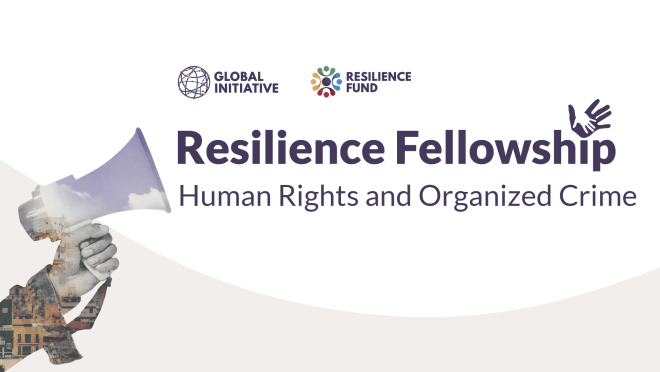Apply for Resilience Fellowship 2023
Apply for Resilience Fellowship 2023

The Global Initiative Against Transnational Organized Crime (GI-TOC) is pleased to announce the fourth edition of the Resilience Fellowship, which for 2023 will have human rights as its theme. The Fellowship builds a platform for cross-sectoral, global and interdisciplinary collaboration between civil society actors, human rights activists, journalists, artists, scholars, policymakers, grassroots community leaders and others working to counter the effects of organized crime.
The Fellowship is part of the GI-TOC’s flagship Resilience Fund, which provides grants and support to civil society individuals and organizations working to counter the impacts of criminal governance and violence across the world. Established with a grant from the government of Norway, the Resilience Fund is also supported by the governments of Germany, the Netherlands and New Zealand and works in partnership with international organizations and NGOs worldwide.
The first edition of the Fellowship in 2020 provided support and networking opportunities to a cohort of 10 individuals from around the world on the chosen theme of disappearances related to organized crime. In 2021, the chosen theme was extortion. The Fellows in this cohort worked against different practices of extortion carried out in vastly diverse contexts and cultures, identifying the numerous dynamics and expressions of this criminal method. The ongoing Fellowship in 2022 has environmental crime as its theme, focusing on areas like illegal logging, IUUF, and environmental affectation to indigenous protected areas.
The Resilience Fellowship is based on a three-pronged approach:
Sponsorship: Providing financial support so that Fellows will have the time and resources to carry out their individual work and a collaborative project. Grants of US$15 000 per Fellow will be awarded for one year.
Networking: Offering mentorship opportunities with experts from the GI-TOC, as well as bringing Fellows together to begin a collaborative project to be undertaken during their Fellowship year.
Dissemination: Creating opportunities for Fellows to publicly share their work and ideas – through platforms such as conferences, civil society forums and national and international platforms, which will expand public discourse, deepen engagement with society, and invite the support and participation from the general public and, ultimately, policymakers.
Theme for 2023: Human Rights and Organized Crime
In 2023, the Resilience Fellowship theme will focus on human rights and organized crime. Fellows will use their diverse perspectives to collaborate on a range of outputs based around this theme. As Resilience Fund Ambassadors, Fellows will also raise awareness on how organized crime contributes to human rights violations and advocate for better responses to these violations.
Human rights around the world are under threat due to the presence of organized crime and criminal governance. In parallel to human rights violations at the hands of state actors, due to the violence and intimidation associated with it, organized crime is increasingly threatening the safety and security of citizens and furthering the perpetration of human rights violations.
Either when acting alone or in collaboration with corrupt state actors, organized criminal groups constantly use violence and intimidation to fulfil their interests, violating the right to life, liberty, security of person, property, freedom of movement, and freedom of speech, among many other fundamental rights. In this context, civil society organizations and individuals have often shifted or adapted their mandates, initiatives, and purposes after facing threats from organized crime, having however limited tools and resources to do so.
Here are a few examples of issues and projects that can be helpful in guiding your application. Organized crime and human rights can include a broad range of specific topics and issues and the following list is non-exhaustive. However, a successful application must clearly elaborate on the direct correlation between both topics.
Human rights and organized crime:
- Youth and children’s rights as threatened by forced labor, modern slavery, or human trafficking.
- Youth and children rights as threatened by the activities of criminal groups including recruitment by gangs, or their involvement in criminal activity like extortion, micro-trafficking, or murder-for-hire.
- Women’s rights as violated by manifestations of criminal governance and exploitation, including sexual exploitation, human smuggling and trafficking, forced labor in mining, manufacturing or agricultural sectors.
- Indigenous rights endangered by the presence of criminal markets, including land grabbing, illegal logging, illegal mining, or illegal crop plantations in protected territories.
- Gender rights including the harassment or systematic attacks to LGTBQIA+ communities by criminal actors.
- Migrant rights jeopardized by criminal organizations controlling routes or mobility.
- Protection of freedom of speech, especially regarding independent media houses and journalists, from harassment or attacks by criminal actors.
- Protection of digital rights, including where organized criminal groups exploit vulnerable communities through digital threats, or where anti-cybercrime legislation is used by authorities to crack down on protest, freedom of speech or information sharing.
How to apply (ONLINE FORM)
Interested parties must submit an application through the online form provided in the Resilience Fund webpage (link also available at the end of this section). This form contains a set of questions where the applicant should highlight her/his/their background, how he/she/they worked to address organized crime and human rights in communities, and a proposed project for the Fellowship.
Please make sure that your responses are clear, succinct and do not exceed the maximum of words stablished.
You will not be able to attach any documents to your application. Please make sure that you have included all relevant information in the online form. It will not be possible to edit it once it has been submitted. Applications will not be received by email. They must all be submitted via the online form.
If you have technical issues uploading your application or if you have any questions, please contact: [email protected]


